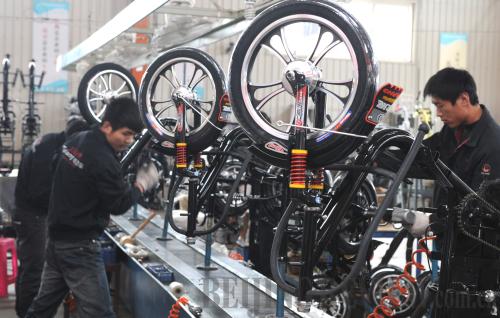|
 |
|
MILLIONS OF WHEELS: Employees of Ta Lang Electric Bicycle Co. Ltd. in Wangqingtuo Town, Tianjin, install a remote anti-theft mechanism on an electric bicycle. The town is home to 268 bicycle makers and reported an annual output of 10.8 million units in 2009, making up 10 percent of the nation's total (MA PING) |
Regulating Investment
The State Council, China's cabinet, on April 13 released new regulations on overseas investment, pledging good business conditions but restricting funds to environmentally unsound projects.
According to the new regulations, China welcomes foreign investment in hi-tech industries, service sectors, energy-saving and environmental protection; but polluting and energy gorging projects or initiatives in industries running at overcapacity are not wanted.
The State Council said qualified foreign-funded companies are allowed to go public, and issue corporate bonds or medium-term bills in China.
Foreign-funded enterprises are also encouraged to increase their investment in China's central and western regions, particularly in environmentally friendly and labor-intensive companies.
Trade Friction
The Ministry of Commerce announced the imposition of anti-dumping duties on oriented electrical steel imported from the United States and Russia starting April 11.
It is the first anti-dumping and anti-subsidy investigation launched by China against imports from other countries, the ministry said.
The United States has subsidized the exports, which caused substantial damage to China's steel industry, the ministry said.
The ministry decided to levy anti-dumping duties ranging from 7.8 percent to 64.8 percent on U.S. exports and anti-subsidy duties of between 11.7 percent and 44.6 percent.
Anti-dumping duties between 6.3 percent and 24 percent were imposed on Russian exports as well.
Property Withdrawal
All 78 designated central state-owned enterprises (SOEs) have presented detailed plans to withdraw from the property sector by April 12, said the State-owned Assets Supervision and Administration Commission (SASAC).
On March 18, the SASAC ordered the 78 central SOEs whose core business is not real estate to pull out of the housing market, and hammer out detailed plans of their withdrawal within 15 working days.
The order reflects the determination of the Central Government to tame house prices, though it remains to be seen how effective the measure will be, said Feng Ke, Director of the Research Center of Real Estate and Finance at Peking University.
Optimistic GDP Prediction
The Asian Development Bank (ADB) on April 12 lifted its forecast for China's 2010 GDP growth, but said the figures may cool slightly in 2011 due to monetary tightening measures.
ADB lifted its 2010 GDP growth forecast to 9.6 percent, compared with the 8.9 percent prediction made in September 2009. For 2011, it expects GDP growth to be slightly lower at 9.1 percent.
"As the recovery becomes stronger, authorities need to keep tabs on the rising commodity and asset prices, and resort to regulatory intervention when required," said Jong-Wha Lee, chief economist of ADB. | 